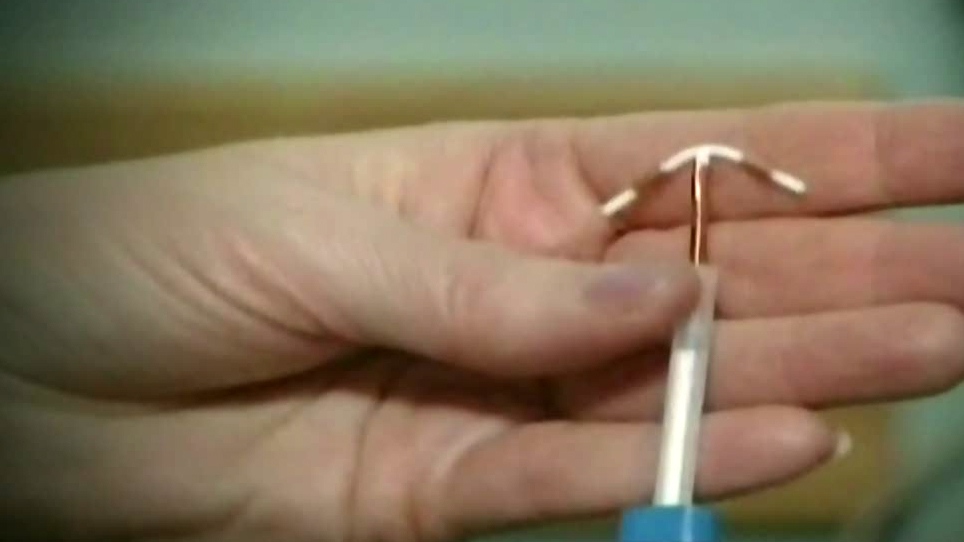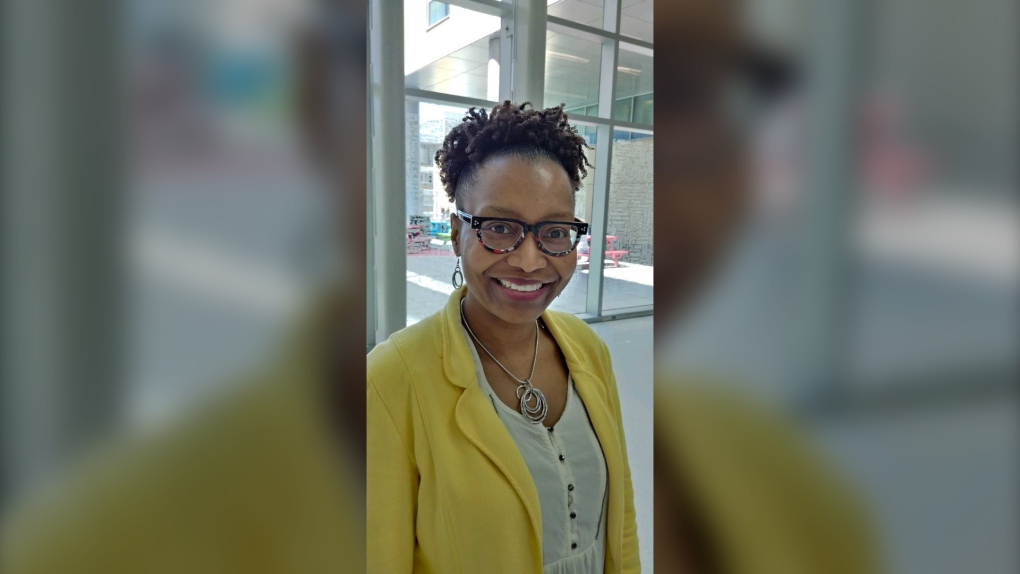Taking matters into their own hands: denied care, more Montreal women removing IUDs themselves
One Montreal woman who removed her contraceptive intrauterine device herself said it was far from her first choice.
In fact, Maude Plourde-Desjardins said, she tried to get an appointment at more than 15 health clinics, but all refused to provide her with the service.
"It’s not normal. I shouldn’t have to do that," she said, “but I felt desperate.”
She's not alone. The DIY approach to IUD removal has become more common, it seems, with some women even consulting online videos to help them accomplish the task.
The situation has prompted a leading obstetrician-gynecologist to issue a warning about the risks involved with the practice and to express frustration about the lack of access to care for women.
FIVE MONTHS OF FRUSTRATION AND PAIN
In September, Plourde-Desjardins called her family doctor, with some urgency, to ask her to remove the IUD that she’d had in place for three years.
“I asked her to take it out because I was experiencing pain during my period, but also outside of it,” she said.
The 26-year-old woman, who first told her story to La Presse, said she didn’t get the help and support she needed.
Instead, she said the doctor told her to call back after she chose a new method of birth control that met with her approval -- something other than condoms, the method Plourde-Desjardins had settled on.
"At first I was -- I’m not sure what you’re saying. You’re saying you're not going to remove it because the contraception I chose was not safe enough, in your opinion?" she recalled.
"I was frustrated, I was shocked, I didn’t understand why."
She said the doctor did order tests to investigate her health and the source of the pain, but when the results came back normal, still refused to remove the IUD and prescribed pain medication, a solution Plourde-Desjardins found unacceptable.
"No, absolutely not," she said. "If I have something inside my body that I can remove, I prefer to remove it [rather] than taking pills for the problem. [The IUD] is not something I need to survive."
CLINICS 'DON'T OFFER THE SERVICE'
Not willing to live with so much discomfort, Plourde-Desjardins began calling clinic after clinic in her Hochelaga-Maisonneuve neighbourhood and in other areas of Montreal to try and get help.
She was told "that they can’t take me because I'm not a patient there, or they don’t offer the service of taking out the IUD because of the pandemic," she said.
By late January, she’d contacted nearly 20 locations to no avail and was tired of living with the discomfort. She decided she would tackle the problem herself.

Her online research had led her to a variety of videos, some produced in the United States and some in Europe, that explained how a woman could, on her own, remove the tiny, flexible device that had been inserted in the uterus.
"It was easy, it wasn’t painful at all," Plourde-Desjardins said.
"Finding the string was a little more complicated," she added. "But once you have it, it came out really easily."
'PLEASE DON’T DO IT BY YOURSELF'
Obstetrician-gynecologist Dr. Martine Bernard and some of her colleagues were "shocked" to hear about Plourde-Desjardins’ plight and to learn that those self-help tutorials for IUD removal exist.
The specialist, who works at Maisonneuve-Rosemont Hospital, said she started asking her young patients about the “phenomenon” and learned that others were also struggling to get care.
She now wants to try and prevent others from taking the matter into their own hands.
"My message I can say to women who have the IUD inserted [is], 'Please don’t do it by yourself,'" she said.
"It’s not a benign act, it’s not a benign thing to do. There are risks. So it was really a big concern for us."
One of the doctor's worries is about introducing germs that can cause infection, but that's not all.
"You can harm yourself [as you] find the string -- it’s not easy to find it," she said.
"Sterility, it’s not always sterile, so you can have an infection," said Bernard, who is also secretary at the Association of Obstetricians and Gynecologists of Quebec (AOGQ).
 Dr. Martine Bernard
Dr. Martine Bernard
She urged women to knock on as many doors as they can to try and find a professional to help them with the issue. She also decried the lack of access to women's health care.
"I hear about so many things we can do for women’s health. This thing is so basic, so simple, just to have access…we have to work on it, not only the specialists but the first [line] care," she said.
Bernard notes an IUD can safely remain in a woman’s body for five or ten years depending on the type inserted, but they do have an expiration date. That means it's doctors' responsibility to be available for the removal, she said.
"If you put something in a woman’s body you have to offer... a service après-vente, a service after sale," she said, that includes information about how and when to get the IUD removed.
She also said it’s equally important to see either an obstetrician-gynecologist, a family doctor or a nurse practitioner to remove the IUD, so they can discuss other pregnancy-prevention options with the patient.
As for the family doctor who refused Plourde-Desjardins services because the woman wanted to rely on condoms instead, Bernard said "there is no place in medicine to think this way anymore, that’s for sure," calling it “maternalistic.”
"You can give all the information, you can give your advice, but in the end, the decision is the woman’s decision, it’s not yours," Bernard said.
GYNECOLOGY ACCESS AFFECTED BY PANDEMIC: MINISTRY
The AOGQ now plans to investigate further to see if the problem is occurring primarily in Montreal, or also in other regions of the province.
A health ministry spokesperson told CTV News in an email that access to gynecological services related to contraception was affected by the pandemic.
"There was a backlog of requests for consultations in specialized services in all sectors," Marjorie Larouche wrote.
"With the support of the MSSS, the gynecology teams are working to make up for the delays," in collaboration with the rest of the health network.
Larouche emphasized the ministry does not recommend women remove an IUD themselves, because "the risk of injury is significant."
Plourde-Desjardins agrees it’s "really preferable to do it with a professional," and wishes she didn’t have to go through all that "worrying, and feeling really alone," she said.
CTVNews.ca Top Stories

Richard Perry, record producer behind 'You're So Vain' and other hits, dies at 82
Richard Perry, a hitmaking record producer with a flair for both standards and contemporary sounds whose many successes included Carly Simon’s 'You’re So Vain,' Rod Stewart’s 'The Great American Songbook' series and a Ringo Starr album featuring all four Beatles, died Tuesday. He was 82.
Hong Kong police issue arrest warrants and bounties for six activists including two Canadians
Hong Kong police on Tuesday announced a fresh round of arrest warrants for six activists based overseas, with bounties set at $1 million Hong Kong dollars for information leading to their arrests.
Read Trudeau's Christmas message
Prime Minister Justin Trudeau issued his Christmas message on Tuesday. Here is his message in full.
Stunning photos show lava erupting from Hawaii's Kilauea volcano
One of the world's most active volcanoes spewed lava into the air for a second straight day on Tuesday.
Indigenous family faced discrimination in North Bay, Ont., when they were kicked off transit bus
Ontario's Human Rights Tribunal has awarded members of an Indigenous family in North Bay $15,000 each after it ruled they were victims of discrimination.
What is flagpoling? A new ban on the practice is starting to take effect
Immigration measures announced as part of Canada's border response to president-elect Donald Trump's 25 per cent tariff threat are starting to be implemented, beginning with a ban on what's known as 'flagpoling.'
Dismiss Trump taunts, expert says after 'churlish' social media posts about Canada
U.S. president-elect Donald Trump and those in his corner continue to send out strong messages about Canada.
Heavy travel day starts with brief grounding of all American Airlines flights
American Airlines briefly grounded flights nationwide Tuesday because of a technical problem just as the Christmas travel season kicked into overdrive and winter weather threatened more potential problems for those planning to fly or drive.
King Charles III is set to focus on healthcare workers in his traditional Christmas message
King Charles III is expected to use his annual Christmas message to highlight health workers, at the end of a year in which both he and the Princess of Wales were diagnosed with cancer.

































